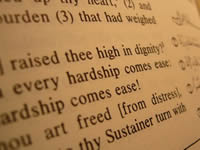 There is a communal and public aspect of Ramadan that helps to bind Muslims as a community (ummah in Arabic), and there are the logistics of fasting that help us balance our daily responsibilities around the commitment to fast. But the act of fasting is, at its heart, a very personal spiritual experience–a contract between ourselves and our Creator that helps to reestablish our place with respect to Him.
There is a communal and public aspect of Ramadan that helps to bind Muslims as a community (ummah in Arabic), and there are the logistics of fasting that help us balance our daily responsibilities around the commitment to fast. But the act of fasting is, at its heart, a very personal spiritual experience–a contract between ourselves and our Creator that helps to reestablish our place with respect to Him.
Fasting serves the mental purpose of taming our ego, the physical purpose of putting mind over body, and the spiritual purpose of submitting ourselves to God’s will.
It is human nature to empower and elevate ourselves. This isn’t necessarily a bad thing, but when left unchecked, it can become an addiction that upsets the critical balance between people that is needed for a civil society. Muslims, like all humans, are no exception to this instinct. Left to our own devices, we would worship only ourselves and resist any attempt to put rules and restrictions on our behavior. But there is an inner voice or state–Muslims refer to it as our fitra–that recalls a primordial covenant with God to recognize His authority over all things. It is this basic relationship between human and divine that Ramadan seeks to reestablish.
It is one thing to set aside time to give thanks for the blessings one has. It is another thing altogether to take away some of the most basic blessings–the gifts of clean water to drink and nourishing food to eat–in order to drive the point home. Sometimes we humans need to lose something of value in order to realize how lucky and blessed we are. And at that point, we remember what the Qur’an tells us: “With every hardship comes ease.”
As Muslims, we declare that we submit ourselves to the will of God. Ramadan is a means of testing that commitment. It is too easy to cheat on the fast to make it of any use to us in our worldly life–we could always sneak a drink of water or bite of food in a secluded place, or engage in gossip (backbiting) and impure thoughts–and appear pious as we join others breaking their fasts at the end of the day.
But in those moments of difficulty, when the body begs for your attention, it is as if there is no one else but your soul, your body, and God. And in hundreds of moments during the month of Ramadan, whether conscious or not, you reaffirm that commitment: First comes the Creator, then my soul, then my body.
I have related many of the reasons why I fast–the controlling and taming of desire, the elevation of the spirit over the body, the remembrance of the divine writ, and the thanks for the blessings that I take for granted the rest of the year. But there is really only one reason that I fast, and it is the only one that matters.
He asked me to. And I obey.

